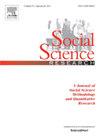COVID-19 就业冲击和安全网扩张:对流离失所工人的健康影响
IF 3.2
2区 社会学
Q1 SOCIOLOGY
引用次数: 0
摘要
COVID-19 导致就业机会急剧减少,主要集中在服务业。先前的研究表明,这种冲击会对健康和福利产生负面影响。然而,大流行病危机的性质与众不同,可能减轻了任何此类负面影响,失业保险(UI)的历史性扩张可能使工人免受负面健康后果的影响。我们利用服务业工人的雇主-雇员关联横截面数据(N = 15219)和面板数据(N = 3307)来估计 COVID-19 期间失业对健康和福利的影响。通过使用雇主固定效应、滞后因变量以及关注因机构倒闭而导致的失业的模型来最大程度地减少混杂因素,我们发现失业对健康和幸福有负面影响。然而,在失业保险最慷慨的时期,或者在失业保险完全取代失业前工资的情况下,领取失业保险的失业工人的情况并不比继续就业的工人差。尽管失业保险可以防止健康状况恶化,但相对于在大流行病高峰期工作而言,领取丰厚的失业保险福利并不会带来健康优势。本文章由计算机程序翻译,如有差异,请以英文原文为准。
COVID-19 employment shocks and safety net expansion: Health effects on displaced workers
COVID-19 precipitated sharp job losses, concentrated in the service sector. Prior research suggests that such shocks would negatively affect health and wellbeing. However, the nature of the pandemic crisis was distinct in ways that may have mitigated any such negative effects, and historic expansions in unemployment insurance (UI) may have buffered workers from negative health consequences. We draw on employer-employee linked cross-sectional (N = 15,219) and panel (N = 3307) data from service sector workers to estimate the effects of job loss on health and wellbeing during COVID-19. Using employer fixed-effects, lagged dependent variables, and models that focus on job loss due to establishment closure to minimize confounding, we find negative effects of unemployment on health and wellbeing. However, in periods when UI was most generous or in cases where UI fully replaced pre-job loss wages, unemployed workers who received UI were no worse off than those who remained employed. Although UI protected against worsening health, receiving generous UI benefits did not confer a health advantage relative to working at the height of the pandemic.
求助全文
通过发布文献求助,成功后即可免费获取论文全文。
去求助
来源期刊

Social Science Research
SOCIOLOGY-
CiteScore
4.30
自引率
4.00%
发文量
0
审稿时长
65 days
期刊介绍:
Social Science Research publishes papers devoted to quantitative social science research and methodology. The journal features articles that illustrate the use of quantitative methods in the empirical solution of substantive problems, and emphasizes those concerned with issues or methods that cut across traditional disciplinary lines. Special attention is given to methods that have been used by only one particular social science discipline, but that may have application to a broader range of areas.
 求助内容:
求助内容: 应助结果提醒方式:
应助结果提醒方式:


